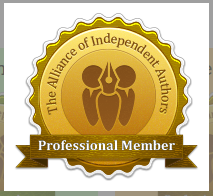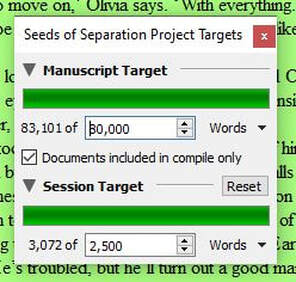 Woo hoo! I'm delighted to report that I've finished the first draft of my eighth novel. I've blogged before about how difficult I've found writing this year, so this is a happy day for me. A long road still lies ahead before publication, as the editing process takes me ages! First, though, I need to set the manuscript aside for a while. This is so that when I start editing I have the benefit of distance, enabling me to spot errors, plot holes, etc., more easily. What will I do in the meantime? After a short break, I'll work on plotting novel number nine. I have some ideas already, so it's a case of choosing one, then fleshing out the story. For me, plotting is the hardest part of the writing process. By nature, I'm a planner, but that doesn't work so well for my books. After a while, I itch to start writing and stop plotting. In addition, I often find that what seems a great idea at the plotting stage doesn't work so well in practice. I'm still developing the way I write, so it's all part of the learning process. I'll keep you posted as to progress with number eight!
0 Comments
I'm getting there... 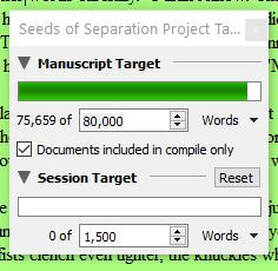 I've shared on this blog and on social media how my writing mojo deserted me for several months earlier in 2020. (Read my other post on this subject here: When novelists lose their love of writing). I don't think the issue was related to the covid-19 pandemic, as my disillusionment began before lockdown happened in the UK. I suspect I'd been pushing myself hard for a while (I'm very goal-driven!) and just needed a break. I spent the time relaxing, reading and enjoying the summer, and didn't worry too much about whether my writing mojo would return. Luckily, it has. My output isn't back to what it was before, when my average daily output was c2,200 words. Nowadays I manage between 1,200 and 1,500 before my creativity wanes, but that's OK. There's no rush. It's more important that I regain my love of writing rather than fret about how many words I write, or how long I'm taking to finish a book. I'm very close to completing my eighth novel, though! As of today's date I've written 75,659 words, and I estimate another 11,000 will see the book completed in first draft format. After that will come the lengthy (for me, anyway!) task of polishing my prose, weeding out any plot holes and getting the manuscript ready for my beta readers/editor. I'll keep you posted! Well-crafted characters - why they're essential to a novel Today I'd like to look at what traits readers love in a character. As well as what they hate! My reason? I've just finished reading a book that's garnered high praise from literary pundits, but which failed to impress me. The main reason was the characters - totally flat and unbelievable, very one-dimensional. The protagonist was cold, unfeeling, dismissive of her parents because they lacked money. Yet the author wanted me to believe this person was also capable of a great, undying love. By that time I'd given up caring about her, repelled by her personality. The other characters were no better. To make matters worse, the plot lacked depth and cohesion, along with an unsatisfactory ending. Crafting great characters is one of the hardest challenges authors face. The storyline might be intriguing, the narrative well written, yet if readers don't identify with the main characters, then the book is unlikely to entertain them. Or even hold their interest past the first few chapters. So what makes a great character? 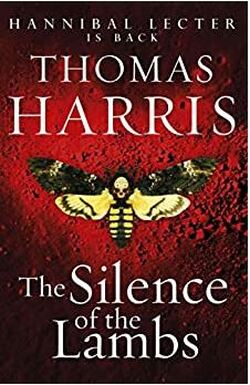 Hannibal Lecter, from Thomas Harris's novel The Silence of the Lambs, springs to mind. This is no cardboard cut-out antagonist, but a complex individual who captures the reader's imagination, partly because he presents two such different sides to his personality. On the one hand, he is cultured, well educated, a former Baltimore forensic psychiatrist. He is knowledgeable about art, literature and cuisine. Yet he is also a psychopathic and cannibalistic serial killer. Quite a juxtaposition, isn't it? And that's what makes Lecter such a compelling personality. He'd make a great dinner guest – provided he didn't eat you! What follows are my thoughts on what makes a great character. First, they need to arouse empathy in a reader. I don't necessarily have to like them, but I do need to be on their side, eager for them to overcome their demons by the end of the story. They should also be interesting. I don't want to read about someone who works in a mundane job, has no friends and holds no opinions. That's boring, and in real life we shy away from dull individuals. Instead, I like characters to have fire in their bellies, to laugh, to cry, to experience pain and joy and all the emotions that come attached to this crazy life we're living. Treat 'em mean... 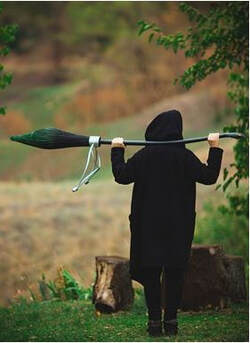 One piece of advice that's often dished out to writers is to torture their characters... and then torture them some more. Wise words, in my opinion! By forcing them to endure angst, loss, loneliness, an author makes them real, because sorrow and tragedy happen to us all. In addition, how a character faces life's trials helps to shape their personalities, meaning that by the end of their novel, they've changed - and for the better. An example is Luke Skywalker from the Star Wars franchise, who morphs from a humble farm boy to a great Jedi warrior. I love it when a character aspires to become a better person, often as a result of pain they've suffered in the past. Sometimes they're the underdog in a novel, a plot device that helps the reader to root for them. Underdogs are called to rise to challenges that will shape their personalities; a notable example is Harry Potter from J K Rowlings' books. Once a mistreated boy forced to live in a cupboard under the stairs, he eventually becomes an accomplished wizard despite facing adversaries such as Draco Malfoy and Lord Voldemort. Speaking of which, antagonists in a novel need to be worthy of the title of villain. Make them dark, make them twisted, make the reader loathe them, yet be fascinated by them. Hannibal Lecter again! To be well-rounded, a characters needs to have flaws, because who doesn't? I don't want to read about someone who's always calm, patient, reliable, consistent - such people don't exist. We're all imperfect, changeable, difficult at times - some of us all the time! This leads me on the my last point - characters need to be believable. Don't give me street thugs who never swear, teenagers who don't act out, couples who never argue. I want reality, in all its ugly glory, because that's what shapes an great read. And I suspect other readers do too. What do you think? Are there any points you can add? What do you like or loathe in a character? Leave a comment and let me know!
A dark, twisted psychological thriller 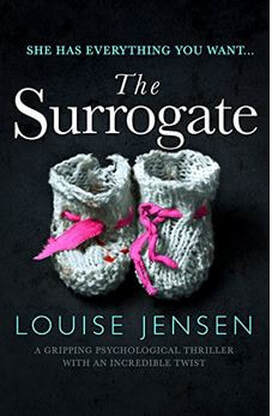 This week's post is a review of 'The Surrogate' by Louise Jensen. A dark, twisted psychological thriller that never fails to entertain, it's the first novel by this author that I've read, but it won't be the last. Here's the Amazon blurb: She can give you everything you want... But can you trust her? Kat and her husband Nick have tried everything to become parents. All they want is a child to love but they are beginning to lose hope. Then a chance encounter with Kat’s childhood friend Lisa gives them one last chance. Kat and Lisa were once as close as sisters. The secrets they share mean their trust is for life... Or is it? Just when the couple’s dream seems within reach, Kat begins to suspect she’s being watched and Nick is telling her lies. Are the cracks appearing in Kat’s perfect picture of the future all in her head, or should she be scared for the lives of herself and her family? How far would you go, to protect everything you love? Fast pace and intriguing plot 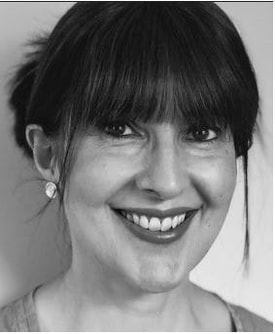 Novelist Louise Jensen Novelist Louise Jensen Wow! Sounds good, doesn't it? I read 'The Surrogate' in one sitting, drawn in by its fast pace and intriguing plot, and the twist at the end came as a shock. The narrative switches between past and present, from hope to despair, but always entertains. If I had to level any criticism at this book, it would be concerning the plot; without wishing to give spoilers, I thought it a little implausible at times. I also found the last few paragraphs jarred; I wasn't convinced Kat would behave that way, not given her current circumstances. These are minor points, however, that didn't detract from my enjoyment of this novel. At the start of the book, Kat is a happily married woman whose life only requires one thing to make it complete: a baby. However, both she and her husband Nick harbour secrets, ones that threaten to derail their relationship. Kat's skeleton in the closet is dark, serving to drive a wedge between her and her best friend, Lisa. Nick's, however, is even darker, mirrored by his damaged family history. Lisa, too, isn't all she seems. At first money and revenge appear to be her reasons for being a surrogate, but as Kat increasingly appears unreliable as a narrator, Lisa's true motives still aren't clear. Until the truth is revealed, leading to a wow! of an ending. This novel is twisted, dark and menacing, with a climax that some readers will love and others, like myself, will question. It embraces themes of revenge, forgiveness, love and parenthood, set against a backdrop of intrigue. You can find out more about Louise and her novels via her website, www.louisejensen.co.uk. Let's hear from you! Have you read 'The Surrogate'? Did you like or loathe it? What about the ending? Leave a comment and let me know!
This week I'm interviewing the lovely Sibel Hodge, a best-selling novelist who writes in a range of genres, including crime and thriller fiction. Welcome to my blog, Sibel! I’d like to know more about your latest novel. What can readers expect to encounter in its pages? 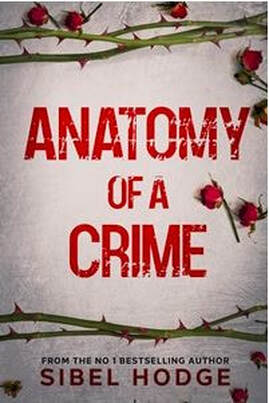 I love books told in an original way so I decided to write 'Anatomy of a Crime' in the format of a true crime podcast that I fell in love with listening to a few years ago. It's a twisty psychological-style thriller that leads readers on a dark, unpredictable journey... On the summer solstice in 2017, two girls walk into Blackleaf Forest. Only one comes out alive. Dubbed as the Sleeping Beauty Killer, and surrounded by rumours of witchcraft, Caris Kelly is sentenced to life in prison for murdering her best friend during a ritualistic thrill kill. Although Caris insists she is innocent, no one believes her. Then three years later, investigative journalist Lauren Taylor looks into the murder for her true crime podcast. She becomes convinced there's more to the flimsy witness testimony, sinister coincidences, and sensational press coverage and probes into the case. As prejudices are revealed, lies are uncovered, and secrets are blown wide open, a single question remains... is there really one truth about what happened that night? Or are there only different versions of the same story? Tell us about yourself and what you get up to when you’re not writing.When I'm not writing I usually spend a long time researching for the next novel! I also read 2-3 books a week. In my spare time you'll find me exercising, spending as much time in nature as I can, catching up with friends, and cooking. What have you written to date? 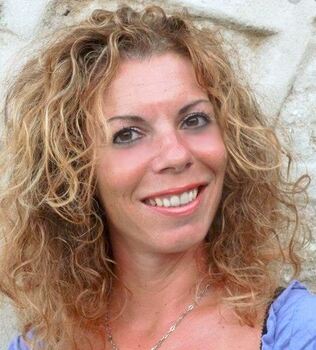 Novelist Sibel Hodge Novelist Sibel Hodge I've written ten thrillers, three romantic comedies, seven cozy mysteries, one contemporary romance, one young adult novel, one children's novel, two novellas, and three non-fiction, including two vegan cookbooks. I'm a hybrid author, published both traditionally and independently. When I first started writing I concentrated on romantic comedies and comedy/cozy mysteries that were a great fit for me at the time. But as my writing journey progressed, so did my life journey, and I wanted to start tackling darker subjects I could give a voice to as a writer that I felt weren't getting the mainstream attention they deserved. The first serious book I wrote in the crime genre was a novella about sex trafficking, and since then I've written multiple thrillers about many different types of trafficking, from exotic animals to organ trafficking, child and labour trafficking, and trafficking for ritual abuse. Do you have a special time to write? A writing routine? Do you work to an outline or plot? I'm very focused, so when I'm working on a first draft I get up about 6ish and then do some yoga and meditation before I start writing. I aim for 3000-5000 words per day. The first draft will usually take 3-4 weeks. As for plotting, I'm a total pantster! I know the underlying theme of a novel when I start writing, and most of my thrillers involve a lot of research that I have to condense into something readable, but I have no idea what's going to happen until I start writing. I let my characters lead the way. Where do your ideas come from? I like to write what I call true fiction. A lot of the novels I've written in the last ten years are inspired by real life events. I'm very passionate about animal and human rights and want to give a voice to darker subjects to raise awareness, particularly in tackling corruption, conspiracy, and women's issues. What book are you reading at present? 'Virus Mania' by Torsten Engelbrecht and Köhnlein Claus. Do you proofread/edit your own books or do you get someone else to do it?My hubby is my chief beta reader, which is great because he's not a reader so he'll point out a lot of things that I'm too close to see. If I'm indie publishing a book I'll send it out to a few more beta readers to get their helpful feedback. Then they all go to be professionally edited and proofread. Do you think the cover plays an important part of the buying process? Absolutely. And although I can't use a cover design program, I'll always have a clear idea in my head of how I want the cover to look so I can give as much visual instruction to the designer as possible. How do you select the names of your characters? I always get an idea in my head that fits a name to a personality type of the character I want. It's also a bonus to have the names of main characters as short as possible so it's less typing! What kind of research do you do? I do masses of research that sometimes spans years because I'm writing about real life events that I want to make as authentic as possible. I collate information from a huge range of sources from alternative news/mainstream media/investigative journalism/books/government agencies and reports/victims' accounts/documentaries. What is the first book to make you cry? 'Go Ask Alice' by Anonymous. I read it when I was about ten and it really stuck with me. What is the hardest/easiest thing about writing a book? The hardest? Collating and condensing the amount of research into something that weaves into the story seamlessly. The easiest? My books are very character driven, and I love getting inside my characters' heads. One of the things I find easy is expressing the psychology of their thoughts, actions, emotions, and personality. I think being an author is a lot like being an actor, but you have to wear all the characters' skins, not just one. Thanks, Sibel, for a great interview! You can find out moe about Sibel and her novels via her website, www.sibelhodge.com/
Author burnout - an occupational hazard?  Some of you already know that I've struggled to find my writing mojo in 2020. All was well until February, when I suddenly found I couldn't summon up the desire to write. The coronavirus restrictions hadn't yet come into force, so that wasn't the reason. Instead I believe I was experiencing a minor case of burnout. I'm quite a driven individual and over the last two decades I've pushed myself hard in various ways. They include extensive travel (always a joy), moving three hundred miles away, leaving my accountancy career, operating a dog walking business before becoming a full-time novelist, achieving other important goals, etc. It's all been great fun and I have no regrets. But inside me, things were changing. I began to experience a strong urge to slow my life down. The thought of waking up to my alarm clock didn't appeal (did it ever?) I yearned to do more than just write. I wanted to spend time with friends, make new ones, exercise more, improve my Spanish, etc. The pressure authors experience to pump out books filled me with dread. I wanted to write for love, not because I was on a production schedule. To my horror, I realised I no longer wanted to write. Anything. At all. I'd published seven novels as well as a novella and a non-fiction book. Perhaps I'd taken my writing as far as it was meant to go? This wasn't a case of writer's block. I didn't sit in front of a blank screen, desperate to conjure up words. Instead I avoided writing all together, despite having completed a good chunk of my eighth novel. I told myself my writing mojo would soon bounce back. It didn't. Unsure how to proceed, I turned to my author friends for help. To my surprise, they'd either gone through, or were currently experiencing, the same dilemma. Here are some of their comments: I'm having the same doubts as to whether to continue writing, whether its worth the backlash and all the intense hard work. I too want to try to take my writing to the next level, but am plagued by doubts. I had an email from an author friend saying exactly the same thing, and that he was on the verge of quitting. Phew! At least I knew I wasn't alone in this. I was also lucky enough to have a wonderful accountability partner. We check in with each other about our writing goals each Sunday via Skype and midweek via email. During this difficult time he was a huge source of support and encouragement, even when weeks turned into months and I still hadn't written anything. How is my writing going now? I'm pleased to report that, while I'm by no means out of the writing doldrums, things have improved significantly. What's changed? Two things. First, I asked myself whether, given that I'd dreamed of being a novelist for decades, it was likely I'd lost my writing mojo forever. Was this just a blip instead? The answers came back: no, and probably. Second, my writing buddy suggested I write a few words on my novel and see where it took me. I agreed, and committed to doing 1,000 new words the following week. And I did. The next week I managed 5,000 and the one after that, 6000. It's a way off the 2,000+ words I used to write daily before my 'blip', but I'm not worried. I'm writing again, and so far I've added over 24,000 new words to my eighth novel. At times I've even felt flashes of my old drive and energy, which is wonderful.
My aim is to complete the novel and get it to my editor/beta readers by Christmas. I'll keep you posted! Thanks for reading. 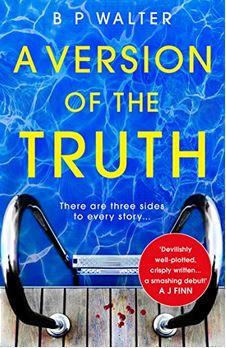 This is the first book by B P Walter that I've read, and I'm looking forward to more. A gripping psychological thriller, it weaves the stories of Julianne and Holly into a roller-coaster read that hooked me from the start. Here's a taster: 2019: Julianne is preparing a family dinner when her son comes to her and says he’s found something on his iPad. Something so terrible, it will turn Julianne’s world into a nightmare and make her question everything about her marriage and what type of man her husband is or is pretending to be. 1990: Holly is a fresher student at Oxford University. Out of her depth and nervous about her surroundings, she falls into an uneasy friendship with a group of older students from the upper echelons of society and begins to develop feelings for one in particular. He’s confident, quiet, attractive and seems to like her too. But as the year progresses, her friends’ behaviour grows steadily more disconcerting and Holly begins to realise she might just be a disposable pawn in a very sinister game. A devastating secret has simmered beneath the surface for over twenty-five years. Now it’s time to discover the truth. But what if you’re afraid of what you might find? Two women, two timelines, one awful truth... First, let's deal with the characters. None of them are particularly likable, in my opinion. Julianne has a tendency to bury her head in the proverbial sand when it comes to her husband. James, Ernest, Peter and Ally are self-absorbed and cruel. Holly is unbelievably naive and at times an inverted snob. None of this matters; I'm not the kind of reader who needs to like characters in a novel, but they do need to interest me. And they did. When would the scales fall from Julianne's eyes? Why can't Holly see how warped her friends are? Is James really that easily led by Ernest? Other downsides to the characters? I wish the author had developed Diane, Julianne's mother, more. B P Walter does a great job of portraying this narcissistic woman and how she undermines her daughter, so i assumed this was part of a character arc/subplot that would develop as the novel progressed. I was wrong - Diane doesn't appear again. A shame, as her acerbic brand of commentary used as the novel reaches its climax would have, in my opinion, added to the tension. As it stands, she appears to contribute nothing to the plot. As for Holly, she vacillates between uptight virginity and sexual abandon in a way that fails to convince. One moment she's a prudish bookworm, the next she's spying on her friends' sex lives. That scene where she hides in a wardrobe? Really? I also rolled my eyes at the way the wealthy characters are portrayed as selfish and uncaring individuals who use their social status to procure their twisted desires with no regard for others. It's stereotypical thinking - 'All rich people are bastards!' - and says more, in my view, about the holders of such opinions than wealthy people themselves. Other loose ends and anomalies Let's move on and examine the plot. Some parts are hard to believe - would James really have saved those documents in the family Dropbox account, even by accident? However tired he might be, its hard to imagine him making such a catastrophic error. Also, the way his character arc ends is weak and far too convenient, letting him off the hook for his crimes. The ending almost calls for a sequel and doesn't answer the question of whether the other members of James's cabbal get their comeuppance. From what we're told, it could go either way, but we never get to find out. The reader is left hanging, which makes for a less than satisfactory finale. So would I recommend 'A Version of the Truth'? You might be thinking that I disliked this novel. I didn't. 'A Version of the Truth' drew me in from the first chapter. It's soon obvious that Julianne's husband harbours a dark side; the mystery lies in the fine details and how James manages to conceal his depravities for so long. I enjoyed the way the stories of Julianne and Holly are interwoven along with the different timelines - that worked well. A warning - this book is not for the faint of heart. It examines rape, people-trafficking, abuses of power, dysfunctional families and class envy. Some readers may find the sexual scenes uncomfortable reading. The novel is dark, twisty and intriguing, despite its flaws. You can check it out via this link: A Version of the Truth. Have you read 'A Version of the Truth'?Did you like it, love it, hate it, find it a bit 'meh'? Leave a comment and let me know!
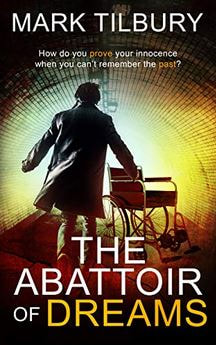 'The Abattoir of Dreams' is thriller writer Mark Tilbury’s third novel, and as I’m a fan of the first two, reading this one was a must! Unlike Mark’s other books, 'The Revelation Room' and 'The Eyes of the Accused', it's a standalone offering and not part of the Ben Whittle investigation series. Instead, in 'The Abattoir of Dreams' Mark takes his writing down a supernatural route, blending a paranormal theme with thriller material, a dash of time travel and dollops of humour. A unique and intriguing concept! Here’s a taster: Michael Tate has not had an easy life. With his father in prison, and his mother dead, Michael was sent to Woodside Children’s Home. Now an adult, Michael wakes up from a coma in hospital suffering from amnesia and paralysis. Confused and terrified, he is charged with the fatal stabbing of his girlfriend, Becky. He also learns he attempted to end his own life. Detective Inspector John Carver is determined that Michael is sent to prison. With no way of defending himself, Michael is left in his hospital bed awaiting transfer to remand. But then strange things begin to happen and his childhood comes back to haunt him. Can Michael ever escape the past? Will he ever discover the truth about Becky’s murder? And why is DI Carver so eager to make him suffer? How does Mark Tilbury blend humour and horror so well?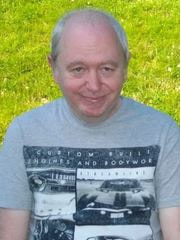 Novelist Mark Tilbury Novelist Mark Tilbury Sounds intriguing, doesn't it? Much of the action takes place in the 1970s, at a government-run children’s home. In recent years we’ve seen the unearthing of many terrible abuse cases that happened at such places, and this theme is examined in depth in 'The Abattoir of Dreams'. The plot delves into many dark concepts, such as cruelty to children, corruption and murder and yet Mark throws in splashes of humour along the way. This is what has struck me before with his writing, and what makes him stand out – I read his books and think, ‘how the hell does he do that?’ You wouldn’t think horror and humour make good bedfellows, yet they do in Mark’s capable hands. He manages it with a succession of witty asides, sarcastic comments and other gems, often in the head of Michael Tate, the protagonist. Talking of characters, what a fine cast we have!There are many dark souls in this book: Michael’s father, Kraft and Malloy at Woodside, and none more dogged in his pursuit of Michael than D I John Carver, the police officer determined to bring Michael to justice. Alongside them are many sympathetic characters, though: Michael’s mother, her friend Rachel and the kindly vicar, Paul Brady. The friendship between the younger Michael and damaged fellow Woodside resident Liam is both tender and touching, and lightens the part of the story that deals with terrible things. And then there’s Michael himself. Paralysed, his memory faulty, he’s vulnerable to the machinations of D I Carver, and the reader feels for his plight, especially once his tragic story begins to be revealed. He needs to confront his past, but how can he when he doesn’t remember it? Michael has friends, however, and not all of them belong to this world. As a ghostly presence transports him back in time, the truth is gradually revealed, and Michael learns what really happened to Becky. Want to know more? Check out these links: 'The Abattoir of Dreams' is a great read. Click or tap this link to view the novel on Amazon: The Abattoir of Dreams.
Want to find out more about Mark and his books? Connect with him via his website: www.marktilbury.com. Combining writing with travel - is it possible?  Patagonia, visited towards the end of my trip Patagonia, visited towards the end of my trip Those who know me well are familiar with my wanderlust! I've been passionate about solo travel for decades now and I've been fortunate to have explored many wonderful countries. For a long time it's been my ambition to combine travel with writing and become, at least for a while, a nomadic novelist. All I need to work is a computer and a decent internet connection, so the idea seemed very achievable. In addition, there were several trips I longed to get under my belt, and most of them were west of the UK, in the Americas. Combined with the nagging feeling I was in somewhat of a rut in Bristol, it wasn't a hard decision to arrange another overseas jaunt. This time I liked the notion of travelling without a set return date. I bought a one-way ticket to Canada to enable me to fly to Toronto in April 2017, with some vague plans as to where to visit after French Canada, which I'd missed on my last trip to the country back in 1990. I ending up spending a couple of months in Canada before I crossed the border into the USA, where I had friends with whom I wanted to reconnect. In America I visited Vermont, then Boston, Philadelphia and Washington, before making my way to Las Vegas, where I hired a car and went touring for a week. My journey included the wonders of Monument Valley, Zion National Park and other beautiful places before I finished up in San Diego. Next came Mexico, El Salvador, Costa Rica, Panama. Colombia, Peru, Ecuador, Bolivia, Chile and Argentina. Towards the end of my trip I seized the chance to travel to the Falklands, South Georgia and the incredible White Continent, Antarctica. WOW!!! What a fantastic experience. The wildlife on South Georgia was awe inspiring - beaches packed full of seals and penguins, accompanied by some very strong fishy odours! As for Antarctica, a friend told me it's like being in a different world, and she was right. The silence, the ice, the remote location… I'd love to return some day and explore further. So how hard was it to travel and write at the same time?  Intriguing Quito, in Ecuador Intriguing Quito, in Ecuador My main fear before I set off was whether I'd be able to combine travelling and writing. My previous trips had usually been done at a fast pace, with lots of planes, trains and buses involved - hardly conducive to the quiet writing environment I prefer! I found it hard to write the first draft of 'His Kidnapper's Shoes' while travelling in 2010-11, and I only completed the book by parking my butt in the gorgeous Bolivian city of Sucre and not leaving until I'd finished. Hence my concern. How would I manage all the sight-seeing I'd want to do while writing my novels? As well as maintaining the rest of my business - marketing, finance, etc? It turns out I needn't have worried. I managed to maintain a full work schedule and still got to visit the sights I want to see. Most times I would work during the morning and get out and about during the afternoon and evenings. I also tried to arrange travel and sight-seeing whenever possible at the weekends. It all worked out really well and my schedule left me plenty of time left to practise yoga, read and socialise. What helped was not having a set itinerary; there was nowhere I needed to be at any particular time. From what I understand, this way of working is becoming more common, with more and more people choosing to become digital nomads. and why not? If your work is internet-based, such as web design or life coaching, then you can earn money wherever you are in the world. You're not location-dependent for your income. It's immensely freeing and if, like me, you love travelling, it's the ideal solution. As I mentioned earlier, I'd become aware I was deep in a rut in Bristol, and needed to break out. It felt right to be backpacking again, with everything I needed in a couple of bags, moving from one wonderful place to another, doing as I pleased. Since my return from that trip, which lasted ten months, I've moved to Newcastle-upon-Tyne and been busy with other things, but I plan to continue combining travel and writing in the future. Who knows, maybe I'll inspire some of my readers to become digital nomads! See you in Rio, perhaps! 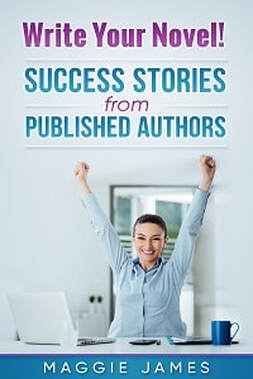 I still feel very much like a newbie when it comes to writing, even though I've been a full-time novelist for over five years, with seven published novels, a novella and a non-fiction book. I remember how I wanted to write a novel but hadn't a clue how to start. Part of my hesitation was down to not knowing any other novelists. If I'd had an example of success to inspire me, perhaps I'd have embarked on my writing adventure sooner. As it is, I'm always looking for ways to encourage would-be novelists. That's why I've compiled a free book as a companion to 'Write Your Novel! From Getting Started to First Draft'. This one is called 'Write Your Novel! Success Stories from Published Authors', and it's packed full of advice and inspiration. Contributors include British best-selling horror writer Iain Rob Wright and American novelist Robert Bidinotto. Read the stories in the book, absorb the wise words contained therein, and I hope you'll be inspired to continue your writing journey. The book is only available from this website and is available in kindle (.mobi), ePub and PDF formats via the image or the button below. |
Categories
All
Subscribe to my blog!
Via Goodreads
|
Join my Special Readers' group and receive a free copy of 'Blackwater Lake'!
|
Privacy policy Website terms and conditions of use
Copyright Maggie James 2018 - current date. All rights reserved.
Copyright Maggie James 2018 - current date. All rights reserved.
 RSS Feed
RSS Feed
